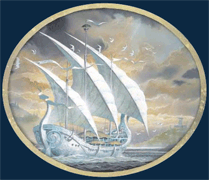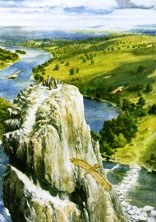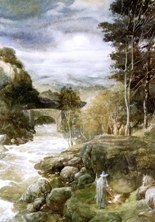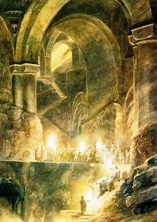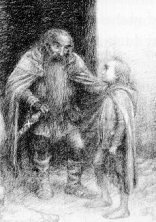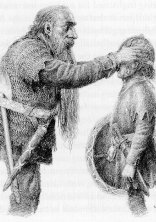Tolkien Calendar: The Hobbit
Tolkien Calendar: The Hobbit
December 30: TA 2941
30 December 2008 11:57:11Categories: Hobbit Calendar
They arrive at Beorn's and stay until spring.
By midwinter, Gandalf and Bilbo had come as far as the home of Beorn, where they would stay until spring, enjoying the Yule celebrations and feasts with the Men Beorn gathered around him in these days. He was well on his way to becoming a great Chief of Men by this time, and some few of his descendants would make an appearance many years later in the War of the Ring. Bilbo very likely learned many stories and much lore during his stay with Beorn, part of the knowledge that he later became so famous for back home in the Shire. The extended stay with Beorn was a needed respite from the hardships Bilbo had endured, and gave him strength for the final months of his journey home. By earliest spring, he found the "Tookish part" of himself growing tired of adventure, while the "Baggins daily grew stronger". It was time to return to Bag End.
© Middle-earth Journeys. Images © Alan Lee.
November 27: TA 2941
27 November 2008 06:39:34Categories: Hobbit Calendar
Gandalf, Bilbo, and Beorn leave Lonely Mountain
Bilbo is now 'weary of his adventure' and 'aching in his bones' for the homeward journey, but before he can start back to his comfy Hobbit hole there is business to attend to and farewells to be made. Firstly there is the question of the Dragon's gold. Bard has received a 14th share of the treasure from Dain (who has dealt more justly with the treasure than the unfortunate Thorin) and now Bard wants to give Bilbo the richest reward of all out of the gifts he makes out of his share (though one wonders why Bilbo share isn't coming directly from Dain, who only gives him a necklace). But Bilbo is ever the practical, down-to-earth Hobbit. Although much altered by his adventure one thing hasn't changed. He isn't seduced by the gold - too much is a trouble: 'How on earth should I have got all that treasure home without war and murder all along the way, I don't know'. In fact he's relieved. Perhaps it's as well the dwarves didn't travel with the Sackville-Bagginses! Bilbo only accepts two small chests of silver and gold, as much as one sturdy pony can carry (not to mention the mithril coat - worth more than all the Shire, even though he didn't know it - the Ring and Sting).
There is other business to finish. When parting with the Elvenking outside Mirkwood he doesn't feel comfortable unless he recompenses him for all the food and drink he consumed while an invisible 'Burglar' in his halls. So he gives him Dain's present of the silver and pearl necklace - ending up with nothing directly from the Dwarves at all except Thorin's personal gift of the Mithril coat. The Elvenking calls him 'Bilbo the Magnificent' and names him 'Elf-friend', a high honour that only readers of the whole of Tolkien's legendarium can appreciate - following in the footsteps of Hurin, Tuirin, Beren and the great men of Middle-earth history.
As well as sorting out the treasure and gifts there are goodbyes to be made. The farewell to the dwarves is made painful by the absence of Thorin (reconciled to Bilbo at the last) and Fili and Kili, Thorin's nephews, who died protecting him. Bilbo bows in homage to the Lonely Mountain where they are buried. The dwarves part with him with fittingly formal words to mark the occasion: 'If ever you visit us again, when our halls are made fair once more, then the feast shall indeed be splendid!' But Bilbo, although being in the middle of grand events, is ever the Hobbit 'If ever you are down my way, don't wait to knock! Tea is at four; but any of you are welcome at any time!' It's these little touches of bathos that grounds Bilbo and The Hobbit and brings it back full circle to homely Hobbit Holes, tea and comfort. For Bilbo the Magnificent tea will ever be at four, no matter how many dragons have intervened.
And so Bilbo leaves the Lonely Mountain with honour, riding beside Gandalf and Beorn and behind the Elvenking himself.
There is other business to finish. When parting with the Elvenking outside Mirkwood he doesn't feel comfortable unless he recompenses him for all the food and drink he consumed while an invisible 'Burglar' in his halls. So he gives him Dain's present of the silver and pearl necklace - ending up with nothing directly from the Dwarves at all except Thorin's personal gift of the Mithril coat. The Elvenking calls him 'Bilbo the Magnificent' and names him 'Elf-friend', a high honour that only readers of the whole of Tolkien's legendarium can appreciate - following in the footsteps of Hurin, Tuirin, Beren and the great men of Middle-earth history.
As well as sorting out the treasure and gifts there are goodbyes to be made. The farewell to the dwarves is made painful by the absence of Thorin (reconciled to Bilbo at the last) and Fili and Kili, Thorin's nephews, who died protecting him. Bilbo bows in homage to the Lonely Mountain where they are buried. The dwarves part with him with fittingly formal words to mark the occasion: 'If ever you visit us again, when our halls are made fair once more, then the feast shall indeed be splendid!' But Bilbo, although being in the middle of grand events, is ever the Hobbit 'If ever you are down my way, don't wait to knock! Tea is at four; but any of you are welcome at any time!' It's these little touches of bathos that grounds Bilbo and The Hobbit and brings it back full circle to homely Hobbit Holes, tea and comfort. For Bilbo the Magnificent tea will ever be at four, no matter how many dragons have intervened.
And so Bilbo leaves the Lonely Mountain with honour, riding beside Gandalf and Beorn and behind the Elvenking himself.
© Middle-earth Journeys. Images © Alan Lee.
November 24: TA 2941
24 November 2008 12:12:50Categories: Hobbit Calendar
Dáin arrives in early morning. The Battle of Five Armies. Thorin and Bolg slain.
This is truly a momentous day in the history of Middle-Earth. Dáin arrives early in the morning, and the weather turns appropriately dark and gloomy. The combined forces of Bard and the Elvenking move forward to block Dáin's approach and prevent him from joining forces with Thorin before the promised ransom of the Arkenstone can occur. Although Bard proposes that they should attack Dáin's forces before they can rest, the Elvenking displays his nobility of spirit by declaring, "Long will I tarry, ere I begin this war for gold. . . . Let us hope still for something that will bring reconciliation." (If only our own leaders had such scruples!)
Dáin, however, decides to attack quickly while the men and elves are debating, but before the three armies can engage, a sudden darkness descends with wind, thunder, and lightning, and from the North a black whirling formation like a "vast cloud of birds" can be seen rushing forward. Gandalf leaps forward, his staff flashing like lightning, and cries out, "Dread has come upon you all! Alas! It has come more swiftly than I guessed. The Goblins are upon you! Bolg of the North is coming, O Dáin! whose father you slew in Moria. Behold! the bats are above his army like a sea of locusts. They ride upon wolves and Wargs are in their train!"
In the face of this terrible new enemy, Dáin, Bard, and the Elvenking set aside their enmity, and so begins The Battle of Five Armies - the Goblins and Wolves against the Elves, Men, and Dwarves. In his description of this great battle, Tolkien creates images for us that he will draw upon yet again in The Lord of the Rings - Bard and the Elvenking defending separate spurs of the Mountain as they are slowly surrounded by foes will reappear during the Battle of the Morannon, when Aragorn, Gandalf and the Dunedain are surrounded upon one hill and Imrahil and Eomer on another; when all appears lost, a hobbit - Bilbo in this tale and Pippin in LOTR - looks up and cries out, "The Eagles are coming! The Eagles are coming!"
But it is the great charge of Thorin and his companions that provides us the most parallels between the two works. We hear echoes of Thorin's rallying cry, "To me! To me! Elves and Men! To me! O my kinsfolk!" yet again in Theoden's battle cry on the Pelennor Fields, "To me! To me! Up Eorlingas! Fear no darkness!" Thorin's reckless, heedless attack upon the main force of Bolg's bodyguard recalls both Theoden's headlong charge against the leader of the Southrons, as well as Eomer's mad, grief-stricken charge into the enemy crying, "Death! Ride, ride to ruin and the world's ending!" after he believes he has lost both Theoden and Eowyn. But the strongest parallel I believe is between Thorin and Boromir in their efforts to regain their honor in battle after having lost their reason to the pressure of an exterior force - Thorin to the "bewilderment" of the dragon treasure and Boromir to the lure of the Ring.
In the end, when all appears lost, the Eagles arrive to help turn the tide of battle, and Beorn himself arrives in his great bear-shape just in time to rescue the mortally wounded Thorin and then return to the battle "grown almost to giant-size in his wrath" to kill Bolg and begin the rout of the remaining Goblin/Warg army.
Bilbo himself took no part in the fighting, putting on his magic ring very early on in the nasty business and then having the bad luck of getting knocked out by a falling stone just after spotting the arrival of the Eagles. Fortunately, he regains consciousness in time to be taken back to camp and bid farewell to a dying Thorin, who has the good grace to mend his relationship with the little hobbit, "Farewell, good thief . . . I go now to the halls of waiting to sit beside my fathers, until the world is renewed. Since I leave now all gold and silver, and go where it is of little worth, I wish to part in friendship from you, and I would take back my words and deeds at the Gate . . . . There is more in you of good than you know, child of the kindly West. Some courage and some wisdom, blended in measure. If more of us valued food and cheer and song above hoarded gold, it would be a merrier world. But sad or merry, I must leave it now. Farewell!"
Here again Tolkien creates a moment that will be relived in LOTR, as echoes of Thorin's situation and words of farewell can be heard in the final words of both Boromir, "I am sorry. I have paid," and Theoden, "Farewell, Master Holbytla! . . . . I go to my fathers. And even in their mighty company I shall not now be ashamed."
For poor Bilbo, the day ends in tears, "You are a fool, Bilbo Baggins, and you made a great mess of that business with the stone; and there was a battle, in spite of all your efforts to buy peace and quiet, but I suppose you can hardly be blamed for that."
Dáin, however, decides to attack quickly while the men and elves are debating, but before the three armies can engage, a sudden darkness descends with wind, thunder, and lightning, and from the North a black whirling formation like a "vast cloud of birds" can be seen rushing forward. Gandalf leaps forward, his staff flashing like lightning, and cries out, "Dread has come upon you all! Alas! It has come more swiftly than I guessed. The Goblins are upon you! Bolg of the North is coming, O Dáin! whose father you slew in Moria. Behold! the bats are above his army like a sea of locusts. They ride upon wolves and Wargs are in their train!"
In the face of this terrible new enemy, Dáin, Bard, and the Elvenking set aside their enmity, and so begins The Battle of Five Armies - the Goblins and Wolves against the Elves, Men, and Dwarves. In his description of this great battle, Tolkien creates images for us that he will draw upon yet again in The Lord of the Rings - Bard and the Elvenking defending separate spurs of the Mountain as they are slowly surrounded by foes will reappear during the Battle of the Morannon, when Aragorn, Gandalf and the Dunedain are surrounded upon one hill and Imrahil and Eomer on another; when all appears lost, a hobbit - Bilbo in this tale and Pippin in LOTR - looks up and cries out, "The Eagles are coming! The Eagles are coming!"
But it is the great charge of Thorin and his companions that provides us the most parallels between the two works. We hear echoes of Thorin's rallying cry, "To me! To me! Elves and Men! To me! O my kinsfolk!" yet again in Theoden's battle cry on the Pelennor Fields, "To me! To me! Up Eorlingas! Fear no darkness!" Thorin's reckless, heedless attack upon the main force of Bolg's bodyguard recalls both Theoden's headlong charge against the leader of the Southrons, as well as Eomer's mad, grief-stricken charge into the enemy crying, "Death! Ride, ride to ruin and the world's ending!" after he believes he has lost both Theoden and Eowyn. But the strongest parallel I believe is between Thorin and Boromir in their efforts to regain their honor in battle after having lost their reason to the pressure of an exterior force - Thorin to the "bewilderment" of the dragon treasure and Boromir to the lure of the Ring.
In the end, when all appears lost, the Eagles arrive to help turn the tide of battle, and Beorn himself arrives in his great bear-shape just in time to rescue the mortally wounded Thorin and then return to the battle "grown almost to giant-size in his wrath" to kill Bolg and begin the rout of the remaining Goblin/Warg army.
Bilbo himself took no part in the fighting, putting on his magic ring very early on in the nasty business and then having the bad luck of getting knocked out by a falling stone just after spotting the arrival of the Eagles. Fortunately, he regains consciousness in time to be taken back to camp and bid farewell to a dying Thorin, who has the good grace to mend his relationship with the little hobbit, "Farewell, good thief . . . I go now to the halls of waiting to sit beside my fathers, until the world is renewed. Since I leave now all gold and silver, and go where it is of little worth, I wish to part in friendship from you, and I would take back my words and deeds at the Gate . . . . There is more in you of good than you know, child of the kindly West. Some courage and some wisdom, blended in measure. If more of us valued food and cheer and song above hoarded gold, it would be a merrier world. But sad or merry, I must leave it now. Farewell!"
Here again Tolkien creates a moment that will be relived in LOTR, as echoes of Thorin's situation and words of farewell can be heard in the final words of both Boromir, "I am sorry. I have paid," and Theoden, "Farewell, Master Holbytla! . . . . I go to my fathers. And even in their mighty company I shall not now be ashamed."
For poor Bilbo, the day ends in tears, "You are a fool, Bilbo Baggins, and you made a great mess of that business with the stone; and there was a battle, in spite of all your efforts to buy peace and quiet, but I suppose you can hardly be blamed for that."
© Middle-earth Journeys. Images © Alan Lee.
November 23: TA 2941
23 November 2008 20:41:56Categories: Hobbit Calendar
Thorin discovers Bilbo's betrayal.
On this day, the joint embassy representing Bard and the Elvenking returns for further parley with Dwarves, and Thorin is astounded to learn not only that they have the Arkenstone of Thrain in their possession, but that it was a member of his own party -- little Bilbo Baggins -- who gave it to them. At this point, Thorin shows us how completely in thrall he is to the "bewilderment" of the great dragon hoard by lifting Bilbo in his arms and threatening to throw the hobbit down onto the cruel rocks below. Thorin is actually ready to murder a friend over this treasure.
Fortunately, Gandalf forestalls such a tragedy by uttering one of my favorite lines in the entire book, "If you don't like my Burglar, please don't damage him. Put him down, and listen first to what he has to say!" The Wizard is a master of understatement, isn't he? And Bilbo's words are indeed most interesting, "Dear me! . . . I am sure this is all very uncomfortable. You may remember saying that I might choose my own fourteenth share? Perhaps I took it too literally - I have been told that dwarves are sometimes politer in word than in deed. The time was, all the same, when you seemed to think that I had been of some service . . . . Is this all the service of you and your family that I was promised, Thorin? Take it that I have disposed of my share as I wished, and let it go at that!" Our hobbit is indeed a very brave little fellow!
Thorin bitterly agrees to ransom the Arkenstone in exchange for Bilbo's one fourteenth share of the hoard "in silver and gold, setting aside the gems," and then parts with Bilbo in the very nastiest of terms, "May we never meet again . . . . Get down now to your friends . . . or I will throw you down . . . . Be off! . . . You have mail upon you, which was made by my folk, and is too good for you. It cannot be pierced by arrows; but if you do not hasten, I will sting your miserable feet. So be swift!" What a horrible experience for poor Bilbo!
It is very important to note that not all of the dwarves are in agreement with Thorin's terrible behavior. The Professor is careful to tell us, "More than one of the dwarves in their hearts felt shame and pity at his [Bilbo's] going." And Gandalf tells Thorin, "You are not making a very splendid figure as King under the Mountain." To top it all off, even as the embassy withdraws with the promise to return in the morning to exchange the Arkenstone for the promised one fourteenth share of the silver and gold, Thorin begins to formulate a plan to forcibly take back the Arkenstone with the help of Dáin, who is due to arrive the next morning, and speedily sends raven messengers to inform Dáin about his predicament and ask him to hurry.
This day shows us Bilbo at his finest, Thorin at his very worst, and forces gathering with the potential for a truly cataclysmic explosion. No wonder The Professor entitled this chapter "The Clouds Burst."
Fortunately, Gandalf forestalls such a tragedy by uttering one of my favorite lines in the entire book, "If you don't like my Burglar, please don't damage him. Put him down, and listen first to what he has to say!" The Wizard is a master of understatement, isn't he? And Bilbo's words are indeed most interesting, "Dear me! . . . I am sure this is all very uncomfortable. You may remember saying that I might choose my own fourteenth share? Perhaps I took it too literally - I have been told that dwarves are sometimes politer in word than in deed. The time was, all the same, when you seemed to think that I had been of some service . . . . Is this all the service of you and your family that I was promised, Thorin? Take it that I have disposed of my share as I wished, and let it go at that!" Our hobbit is indeed a very brave little fellow!
Thorin bitterly agrees to ransom the Arkenstone in exchange for Bilbo's one fourteenth share of the hoard "in silver and gold, setting aside the gems," and then parts with Bilbo in the very nastiest of terms, "May we never meet again . . . . Get down now to your friends . . . or I will throw you down . . . . Be off! . . . You have mail upon you, which was made by my folk, and is too good for you. It cannot be pierced by arrows; but if you do not hasten, I will sting your miserable feet. So be swift!" What a horrible experience for poor Bilbo!
It is very important to note that not all of the dwarves are in agreement with Thorin's terrible behavior. The Professor is careful to tell us, "More than one of the dwarves in their hearts felt shame and pity at his [Bilbo's] going." And Gandalf tells Thorin, "You are not making a very splendid figure as King under the Mountain." To top it all off, even as the embassy withdraws with the promise to return in the morning to exchange the Arkenstone for the promised one fourteenth share of the silver and gold, Thorin begins to formulate a plan to forcibly take back the Arkenstone with the help of Dáin, who is due to arrive the next morning, and speedily sends raven messengers to inform Dáin about his predicament and ask him to hurry.
This day shows us Bilbo at his finest, Thorin at his very worst, and forces gathering with the potential for a truly cataclysmic explosion. No wonder The Professor entitled this chapter "The Clouds Burst."
© Middle-earth Journeys. Images © Alan Lee.
November 22: TA 2941
22 November 2008 09:59:44Categories: Hobbit Calendar
Bilbo gives the Arkenstone to the Elvenking and Bard
Our Bilbo, when he started his adventures, was regarded as something of a fool. Today he earns the respected reputation that he seems to have kept for the rest of his life:
High praise indeed!--I think.
Mixed compliments aside, the Elvenking's praise for Mr. Baggins' character is in response to new traits that Bilbo exhibits in the events of this night: ingenuity, wisdom, courage, and generosity. He devises a diplomatic plan, gives Bombur the slip, makes his way to the 'enemy' camp, gives up the Arkenstone (not without some longing), with some suggestions as how it could be best utilized--and then returns to the dwarves, knowing he'll be facing the music when he has been found out.
Bilbo's language these days reflects his newfound dignity: he alternates between sounding like Gandalf and sounding like some little hobbit lawyer. At the end of today's escapade, however, after he sneaks back to the Lonely Mountain, we find what really moves Bilbo's heart, and it is not precious gems: after he drifts off to sleep, Our Author tells us that he dreams of bacon and eggs.
- The Elvenking looked at Bilbo with a new wonder. "Bilbo Baggins!" he said. "You are more worthy to wear the armour of elf-princes than many that have looked more comely in it."
High praise indeed!--I think.
Mixed compliments aside, the Elvenking's praise for Mr. Baggins' character is in response to new traits that Bilbo exhibits in the events of this night: ingenuity, wisdom, courage, and generosity. He devises a diplomatic plan, gives Bombur the slip, makes his way to the 'enemy' camp, gives up the Arkenstone (not without some longing), with some suggestions as how it could be best utilized--and then returns to the dwarves, knowing he'll be facing the music when he has been found out.
Bilbo's language these days reflects his newfound dignity: he alternates between sounding like Gandalf and sounding like some little hobbit lawyer. At the end of today's escapade, however, after he sneaks back to the Lonely Mountain, we find what really moves Bilbo's heart, and it is not precious gems: after he drifts off to sleep, Our Author tells us that he dreams of bacon and eggs.
© Middle-earth Journeys. Images © Alan Lee.
Last edited: 12 June 2009 11:54:37
